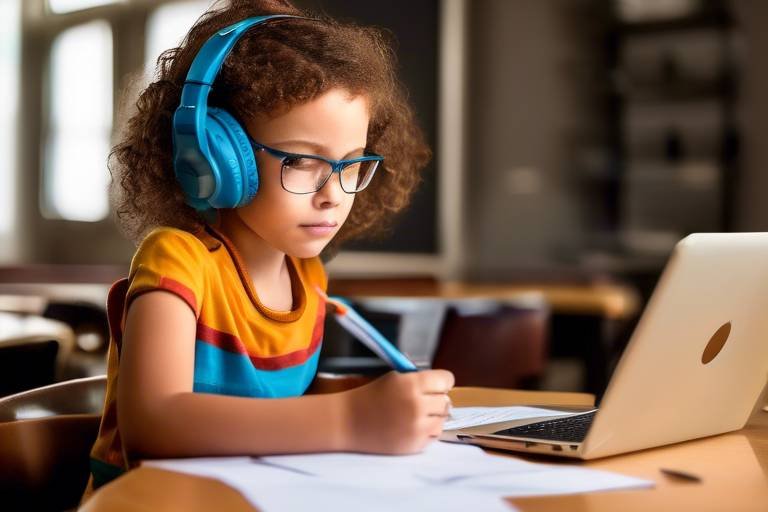The Role of Home Environment in Academic Success
The home environment is like the stage where a child's academic journey unfolds. It plays a pivotal role in shaping not just their educational outcomes but also their overall attitude towards learning. Imagine a child stepping into a cozy, well-lit study space filled with books and resources, versus a cluttered corner with distractions lurking at every turn. The difference is striking, isn’t it? In this article, we will delve into the various aspects of the home environment, including parental involvement, study space, and emotional support, and how they intertwine to influence academic performance.
Parental engagement is like the secret ingredient in the recipe for academic success. When parents actively participate in their child's education—whether it’s helping with homework, attending school events, or simply showing interest in their daily school activities—they create a nurturing atmosphere that encourages learning. Think of it as a team effort; the more parents are involved, the more motivated children feel to excel. Studies have shown that students whose parents are engaged in their education tend to have higher grades and better attendance records. It's a win-win situation!
Now, let’s talk about the importance of a dedicated study space. A well-organized environment can significantly impact a child’s focus and productivity. Imagine trying to work on a project in a noisy, chaotic room versus a quiet, tidy area specifically designed for studying. Which one do you think would allow for more concentration? A dedicated study space minimizes distractions and promotes effective learning. It’s essential for children to have a spot where they can dive into their studies without interruptions.
Having access to the right resources and maintaining an organized study area is crucial for academic achievement. A cluttered workspace can lead to a cluttered mind, making it difficult for children to concentrate. A well-organized study area not only enhances focus but also fosters a sense of responsibility and independence in students. It’s like giving them the tools they need to build their own success. Key resources might include:
- Books and reference materials
- Stationery supplies
- Technology such as computers or tablets
Implementing decluttering techniques can significantly enhance a student's ability to concentrate. Here are some practical tips to create an organized study environment:
- Start small—focus on one area at a time.
- Set up a system for organizing papers and materials.
- Encourage the child to keep only what they need and love.
By following these steps, students can create a space that inspires them to learn rather than distracts them.
Equipping a study space with essential tools can boost learning efficiency. Here’s a list of must-have items for an effective study environment:
- Pens, pencils, and highlighters
- Notebooks and folders
- Calculator and other necessary technology
When students have these tools at their fingertips, they can tackle their assignments with confidence and ease.
Emotional support from family members is another critical component of a child’s academic success. Just like a sturdy foundation supports a building, encouragement and understanding from parents and siblings foster resilience and motivation in students. When children know that their family believes in them, they are more likely to take risks and strive for excellence. It's essential for families to create an atmosphere where children feel safe to express their feelings and challenges.
Open communication within the family can greatly influence a child's attitude towards education. When parents engage in positive dialogue about school and learning, they cultivate a sense of curiosity and engagement in their children. It’s like planting seeds of interest that can blossom into a lifelong love for learning. Encouraging discussions about school can make a world of difference in enhancing a child's academic experience.
Fostering meaningful conversations at home can significantly enhance a child’s academic experience. Parents can ask open-ended questions about their day at school, encouraging children to share their thoughts and feelings. This not only helps children articulate their experiences but also shows them that their opinions matter.
Addressing academic challenges through supportive communication helps children feel valued and understood. When parents discuss difficulties openly, they can work together to find solutions, which instills a sense of teamwork and shared responsibility. It’s crucial for children to know that it’s okay to struggle and that they have a support system ready to help them navigate through tough times.
Q: How can I get more involved in my child's education?
A: Start by attending school events, helping with homework, and having regular discussions about their school day.
Q: What are some signs that my child needs more emotional support?
A: Look for changes in behavior, such as withdrawal, decreased academic performance, or increased anxiety about school.
Q: How can I create an effective study space at home?
A: Choose a quiet area, keep it organized, and equip it with necessary tools like stationery and technology.
Q: What role does communication play in my child’s academic success?
A: Open communication fosters a positive attitude towards education and encourages children to express their thoughts and challenges.

Parental Involvement
This article explores how various aspects of the home environment influence students' academic performance, including parental involvement, study space, and emotional support.
Parental engagement is not just a buzzword; it’s a vital ingredient in the recipe for academic success. When parents take an active role in their child’s education, it can create a ripple effect that positively influences their performance in school. Think of it like a coach cheering on their team from the sidelines. The more involved parents are, the more motivated and supported children feel. This involvement can take many forms, from helping with homework to attending school events, and each of these activities fosters a supportive learning atmosphere at home.
But why does this matter so much? Well, studies have shown that children whose parents are actively involved in their education tend to have higher grades, better attendance, and a more positive attitude towards school. It’s like having a secret weapon in the academic arena! When parents show interest in what their kids are learning, it not only boosts their confidence but also sparks curiosity and a desire to learn more.
Here are a few ways parents can enhance their involvement:
- Homework Help: Sitting down with your child to tackle homework not only helps them understand the material but also shows them that their education is a priority for you.
- School Events: Attending parent-teacher conferences, school plays, or sports events demonstrates to your child that you value their education and achievements.
- Open Discussions: Regularly talking about school can help children feel comfortable sharing their thoughts and challenges, fostering a supportive environment.
Moreover, parental involvement is not limited to just academic activities. Emotional support is equally crucial. When parents engage in their child’s education, they also provide a safety net that encourages children to take risks and explore new ideas without the fear of failure. This balance of support and independence is essential for developing resilience and a growth mindset.
To further illustrate the impact of parental involvement, consider the following table that summarizes key benefits:
| Benefit | Description |
|---|---|
| Higher Academic Achievement | Students with involved parents tend to achieve better grades and test scores. |
| Improved Attendance | Children are more likely to attend school regularly when they feel supported. |
| Enhanced Social Skills | Active involvement leads to better social interactions and relationships. |
| Positive Attitude | Children are more likely to enjoy learning and feel motivated to succeed. |
In conclusion, parental involvement is a powerful force in shaping a child’s academic journey. It’s not just about being present; it’s about being engaged and showing that education matters. When parents step up and take an active role, they not only help their children succeed academically but also foster a love for learning that can last a lifetime.
A dedicated study space can significantly impact a child's focus and productivity. This section discusses how a well-organized environment promotes effective learning and minimizes distractions.
Having access to necessary resources and maintaining an organized study area are vital for academic achievement. This subsection highlights the importance of both in a student's learning journey.
Implementing decluttering techniques can enhance a student's ability to concentrate. This part provides practical tips for creating an organized study environment.
Equipping a study space with essential tools like stationery and technology can boost learning efficiency. This section lists must-have items for an effective study environment.
Emotional support from family members is critical for a child's academic success. This subsection examines how encouragement and understanding foster resilience and motivation in students.
Open communication within the family can greatly influence a child's attitude towards education. This section discusses how positive dialogue encourages academic curiosity and engagement.
Encouraging discussions about school and learning can enhance a child's academic experience. This part explores strategies for fostering meaningful conversations at home.
Addressing academic challenges through supportive communication helps children feel valued and understood. This subsection emphasizes the importance of discussing difficulties openly to find solutions.
Q: How can I get more involved in my child’s education?
A: Start by asking about their school day, helping with homework, and attending school events. Your presence matters!
Q: What if my child resists help with homework?
A: Try to understand their perspective. Maybe they’re feeling overwhelmed. Offer support without pressure.
Q: How can I create a better study environment at home?
A: Ensure the space is quiet, organized, and equipped with necessary tools. A little decluttering can go a long way!

Study Space
Creating an effective is akin to setting the stage for a grand performance; it requires careful planning and attention to detail. A dedicated area for studying can significantly influence a child's focus and productivity. Imagine trying to concentrate on a complex math problem while surrounded by the chaos of a cluttered living room. It’s nearly impossible, right? This is why having a specific place for learning is essential. It signals to the brain that it’s time to switch gears and dive into the world of knowledge.
When designing a study space, consider the lighting, furniture, and overall ambiance. Natural light is a game-changer; it not only boosts mood but also enhances concentration. A desk positioned near a window can transform a dull study session into a vibrant learning experience. Furthermore, the furniture should be comfortable yet functional—think ergonomic chairs and spacious desks that allow for movement and flexibility.
Another critical aspect of a study space is minimizing distractions. This is where organization comes into play. A well-organized environment can promote effective learning by eliminating unnecessary interruptions. For instance, keeping only essential items on the desk—like notebooks, pens, and textbooks—helps to maintain focus. It's like having a clear path in a dense forest; the less clutter, the easier it is to navigate through the tasks at hand.
Having access to necessary resources is vital for academic achievement. An organized study area not only looks appealing but also fosters a sense of readiness and motivation. Imagine a student sitting down to study and finding everything they need at their fingertips. It’s like having a well-stocked kitchen for a chef; the right tools make all the difference. Students should have a variety of resources within reach, including:
- Textbooks and reference books
- Stationery such as pens, highlighters, and sticky notes
- Technology like laptops or tablets for research
By having these resources readily available, students can dive into their work without wasting time searching for materials, thus enhancing their overall productivity.
Implementing decluttering techniques can significantly enhance a student's ability to concentrate. A cluttered space often leads to a cluttered mind, making it difficult to focus on the task at hand. Here are a few practical tips for creating an organized study environment:
- Regularly assess the space: Take time each week to clear out unnecessary items.
- Use storage solutions: Invest in organizers, bins, or shelves to keep items neatly stored.
- Create a cleaning routine: Dedicate a few minutes at the end of each study session to tidy up the area.
By maintaining a clean and organized study space, students can foster a sense of calm and readiness that is conducive to effective learning.
Equipping a study space with essential tools can significantly boost learning efficiency. Here’s a list of must-have items for an effective study environment:
- Notebooks: For jotting down notes and ideas.
- Writing implements: Pens, pencils, and highlighters to make studying interactive.
- Tech gadgets: A reliable computer or tablet for research and assignments.
- Reference materials: Dictionaries and thesauruses for quick access to information.
Having these tools readily available not only saves time but also encourages a proactive approach to studying. It’s like having a toolbox filled with everything you need to tackle any project that comes your way.

Organization and Resources
When it comes to academic success, the organization of a study space and the availability of essential resources are paramount. Imagine trying to read a book in a cluttered room filled with distractions; it’s almost impossible to focus! A well-organized study area not only helps students concentrate better but also instills a sense of responsibility and discipline. It’s like having a personal command center where everything is in its rightful place, ready for action.
First and foremost, let’s talk about resources. What does a student need to thrive academically? Well, it varies from individual to individual, but there are some common tools that can enhance the learning experience. Basic supplies like notebooks, pens, highlighters, and textbooks are just the tip of the iceberg. In today’s digital age, access to technology—such as laptops, tablets, and reliable internet—is crucial. These tools not only aid in research but also facilitate communication with teachers and peers.
Moreover, having a resource-rich environment means more than just physical items. It involves creating a space where students can access information easily. For instance, a small bookshelf filled with reference books, educational magazines, and even a globe can spark curiosity and make learning more engaging. Just imagine how much more interesting history becomes when you can physically see where events took place!
Now, let’s dive into the nitty-gritty of organization. An organized study area should be tailored to the student’s personal preferences and learning style. For example, some students may thrive with a minimalist approach, where only the essentials are present, while others might benefit from a more vibrant environment filled with motivational quotes and colorful stationery. The key is to find what works best for the individual.
To help students maintain an organized study space, here are some practical decluttering techniques:
- Daily Cleanup: Spend a few minutes each day tidying up the study area to prevent clutter from piling up.
- Storage Solutions: Use bins, shelves, and organizers to keep supplies neatly stored and easily accessible.
- Digital Organization: Keep digital files organized on devices to avoid confusion and save time during assignments.
By implementing these techniques, students can create a conducive learning environment that promotes focus and productivity. In essence, a well-organized study space acts as a launchpad for academic success, allowing students to dive into their studies without the overwhelming burden of chaos around them.
In conclusion, the right balance of organization and resources can make a world of difference in a student’s academic journey. When students have access to the necessary tools and an organized space to utilize them, they are more likely to engage deeply with their studies and achieve the success they aspire to.

Decluttering Techniques
Decluttering is not just about tidying up; it's about creating a conducive environment for learning. A cluttered space can be a significant distraction, making it hard for students to concentrate on their studies. So, how do we tackle this issue effectively? Let’s dive into some practical decluttering techniques that can transform a chaotic study area into a focused learning haven.
First off, consider the concept of the one-touch rule. This means that when you pick up an item, you should decide what to do with it right away. Whether it’s putting it back in its designated spot, throwing it away, or taking it to another room, making quick decisions can significantly reduce clutter over time. Imagine if every single piece of paper on your desk had a purpose and a place. How much easier would it be to find your study materials?
Another effective strategy is to sort items into categories. For instance, create specific areas for books, stationery, and study materials. You can even use labeled bins or boxes to keep everything organized. This not only makes it easier to find what you need but also helps in maintaining that organization in the long run. Think of your study space as a well-oiled machine—each part needs to work together seamlessly.
Additionally, implementing a regular cleaning schedule can work wonders. Just like you might have a weekly family dinner or a monthly movie night, set aside time each week to declutter. This could be as simple as spending 15 minutes every Sunday to tidy up. Consistency is key! Over time, these small efforts will accumulate, resulting in a significantly more organized space.
Lastly, don’t forget about the power of digital decluttering. In today’s tech-driven world, students often accumulate a mountain of digital files, notes, and resources. Regularly review and organize these files, keeping only what’s necessary. Consider using cloud storage solutions to keep everything accessible yet organized. Just like a clean desk can boost productivity, a well-maintained digital space can enhance your learning experience.
In summary, decluttering is a crucial step towards creating an effective study environment. By implementing these techniques, you can help students focus better, reduce stress, and ultimately improve their academic performance. Remember, a tidy space is a tidy mind!
Q: How often should I declutter my study space?
A: It's recommended to set aside time weekly for decluttering to maintain a clean and organized environment.
Q: What if my child is resistant to decluttering?
A: Encourage them by explaining the benefits of a clean space. Make it a fun activity by playing music or setting a timer for a quick clean-up challenge.
Q: Are there any specific tools I should use for decluttering?
A: Tools like storage bins, organizers, and labels can be very helpful in keeping a study space tidy and efficient.
Q: Can digital decluttering really make a difference?
A: Yes! Organizing digital files can reduce stress and make it easier for students to find resources quickly, enhancing their productivity.

Essential Study Tools
When it comes to creating an effective study environment, having the right tools at your fingertips can make all the difference. Imagine trying to bake a cake without the essential ingredients—it's just not going to work out, right? Similarly, students need specific tools to facilitate their learning process and enhance their productivity. These essential study tools not only help in organizing thoughts but also in executing tasks efficiently.
First and foremost, a reliable computer or tablet is a must-have. In today’s digital age, most educational resources, assignments, and research materials are available online. A good device allows students to access these resources easily, participate in virtual classrooms, and complete assignments without unnecessary delays. But remember, it’s not just about having a device; it's about ensuring it’s equipped with the necessary software like word processors and educational apps.
Next up, let’s talk about stationery supplies. While it may seem trivial, having the right stationery can significantly boost a student's ability to take notes and organize their thoughts. Essential items include:
- Pens and Pencils: Always keep a variety of pens and pencils handy. Different colors can help in highlighting important information.
- Notebooks: Dedicated notebooks for each subject can help in keeping notes organized.
- Highlighters: These are great for emphasizing key points in textbooks or notes.
- Sticky Notes: Perfect for jotting down quick reminders or important concepts.
Furthermore, an ergonomic chair and desk can’t be overlooked. A comfortable seating arrangement promotes longer study sessions without causing back pain or discomfort. Think of it as building a solid foundation for a house; if the foundation isn’t strong, everything else could crumble. A sturdy desk provides ample space for books, laptops, and other materials, allowing for a clutter-free study zone.
Another important aspect is time management tools. Whether it's a physical planner or a digital app, having a system to keep track of assignments, deadlines, and study schedules is invaluable. This not only helps in prioritizing tasks but also in reducing stress. After all, nothing feels better than checking off completed tasks from a to-do list!
Finally, consider incorporating educational apps and online resources. There are countless platforms that offer tutorials, quizzes, and interactive learning experiences tailored to various subjects. These tools can make learning feel less like a chore and more like an engaging experience. Think of them as your personal tutors available 24/7, ready to assist whenever you need help.
In summary, equipping a study space with essential tools is akin to preparing for a big game. You wouldn’t step onto the field without your gear, and students shouldn't dive into their studies without the right resources. By ensuring they have a computer, stationery, a comfortable workspace, time management tools, and access to educational apps, students can create a conducive learning environment that sets them up for success.
Q1: What are the most important study tools for students?
A1: Essential study tools include a reliable computer or tablet, stationery supplies, an ergonomic chair and desk, time management tools, and educational apps.
Q2: How can I organize my study space effectively?
A2: Keep your study area clutter-free, use dedicated notebooks for each subject, and ensure you have all necessary tools within reach to minimize distractions.
Q3: Why is parental involvement important in a child's education?
A3: Parental involvement fosters a supportive learning atmosphere, encourages academic curiosity, and helps children feel valued, which significantly boosts their motivation and performance.

Emotional Support
When it comes to academic success, from family members can be the bedrock upon which a child's educational journey is built. Imagine a sturdy bridge; without solid pillars, it would crumble under pressure. Similarly, a child who feels supported emotionally is more likely to tackle academic challenges with resilience and confidence. This support manifests in various ways, from simple words of encouragement to actively listening when a child feels overwhelmed. It's essential for parents to create an atmosphere where children feel safe expressing their feelings and concerns about school.
Consider this: when a child knows that their family believes in them, they’re more likely to take risks in their learning. They might ask questions in class or seek help when they encounter difficulties. This is because they feel that they have a safety net to fall back on. Emotional support fosters a sense of belonging and self-worth, which are crucial for a child’s motivation. For instance, when parents praise their child’s efforts rather than just the results, it encourages a growth mindset. They learn that it's okay to make mistakes, as these are stepping stones to success.
Moreover, emotional support extends beyond just encouragement. It involves actively engaging with a child’s academic life. This can include discussing their school day, helping them with homework, or simply being there to listen when they’re feeling stressed. Such interactions not only help children feel understood but also strengthen family bonds. In fact, research shows that children who receive emotional support from their families tend to have better academic outcomes.
Here are some key aspects of emotional support that can significantly influence a child's academic journey:
- Encouragement: Regularly expressing belief in a child’s abilities can boost their self-esteem.
- Active Listening: Taking the time to listen to a child's concerns shows that their feelings are valid and important.
- Providing a Safe Space: Creating an environment where children feel comfortable discussing their academic struggles can lead to better problem-solving.
In essence, emotional support is not just a nice-to-have; it’s a critical component of academic success. It’s the invisible force that can propel a child forward, helping them to navigate the often turbulent waters of education. By nurturing emotional well-being, parents can significantly enhance their child's ability to learn and thrive.
- Why is emotional support important for academic success? Emotional support helps build resilience, confidence, and a positive attitude towards learning.
- How can parents provide emotional support? Parents can provide emotional support by encouraging open communication, actively listening, and showing belief in their child's abilities.
- What role does communication play in emotional support? Open communication fosters a safe environment where children feel comfortable discussing their feelings and academic challenges.

Communication Patterns
When it comes to a child's academic success, the importance of communication patterns within the home cannot be overstated. Think about it: the way families interact can either ignite a spark of curiosity or extinguish it entirely. Open and positive communication creates a safe space for children to express their thoughts, feelings, and even their struggles with schoolwork. It's like planting seeds in a garden; with the right nurturing, those seeds can grow into something beautiful, thriving in an environment that encourages growth.
Consider this: when children feel comfortable discussing their school day, they are more likely to engage in their learning process. This dialogue not only enhances their academic experience but also fosters a sense of belonging and support. Parents can play a pivotal role here by initiating conversations about school, asking questions about subjects that pique their child's interest, or simply checking in on how their day went. This kind of engagement is crucial, as it helps children feel valued and understood, which in turn boosts their motivation.
Moreover, effective communication is about more than just talking; it's also about listening. When children share their academic challenges, it's essential for parents to listen actively and validate their feelings. This kind of interaction builds trust and encourages children to seek help when needed. After all, who wants to feel like they’re navigating their academic journey alone? When families tackle challenges together, they reinforce the idea that learning is a collaborative effort.
To further illustrate the impact of communication patterns, let's look at a few key strategies that can enhance dialogue within the family:
- Encouraging Questions: Prompt your child to ask questions about what they learn. This not only shows that you value their thoughts but also encourages critical thinking.
- Sharing Experiences: Share your own learning experiences or challenges. This can help children see that struggles are a normal part of the learning process.
- Setting Aside Time: Dedicate specific times for family discussions about school. This creates a routine that children can rely on.
In addition, addressing academic challenges openly is crucial. When children face difficulties, they may feel overwhelmed or discouraged. By discussing these challenges in a supportive manner, families can help children find solutions together. It’s like being on a team; when everyone works together, they can tackle any obstacle that comes their way.
In summary, the patterns of communication established within the home can significantly influence a child's academic journey. By fostering an environment of open dialogue, active listening, and collaborative problem-solving, parents can help their children navigate the ups and downs of their educational experience. Remember, effective communication is not just about the words spoken; it’s about the connections made and the support provided. When children feel heard and understood, they are more likely to thrive academically and emotionally.
- How can I improve communication with my child about their schoolwork?
Start by asking open-ended questions about their day and showing genuine interest in their responses. Make it a routine to discuss school topics regularly. - What if my child is hesitant to share their academic struggles?
Create a safe space where they feel comfortable expressing themselves. Let them know that it's okay to struggle and that you're there to help them find solutions. - How important is listening in communication?
Listening is crucial! It shows your child that their thoughts and feelings matter, which can encourage them to open up more.

Encouraging Discussions
Engaging in meaningful discussions about school and learning is a cornerstone of fostering a child's academic success. When parents take the time to talk with their children about what they are learning, it not only shows that they care but also reinforces the importance of education in daily life. Imagine your child coming home from school, bubbling with excitement about a new project. Instead of simply nodding and moving on, you can dive deeper by asking questions like, “What was the most interesting part of your day?” or “What challenges did you face?” This kind of interaction not only validates their feelings but also encourages them to articulate their thoughts and experiences.
To create an environment ripe for these discussions, consider setting aside a specific time each week for family conversations. This can be during dinner or a casual weekend breakfast. The key is consistency—making it a routine helps children know that their thoughts and feelings about school matter. During these discussions, parents can introduce topics that stimulate curiosity, such as:
- The latest book your child is reading and their thoughts on it.
- Current events and how they relate to what they are learning in school.
- Future aspirations and what steps they can take to achieve their goals.
Moreover, it’s essential to foster an atmosphere where children feel comfortable sharing their struggles. When children know they can talk about their difficulties without judgment, they are more likely to seek help when they need it. For example, if your child is struggling with math, instead of expressing frustration, try saying, “Let’s figure this out together!” This approach not only helps them academically but also strengthens the emotional bond between parent and child.
Additionally, parents can utilize various strategies to enhance these discussions. For instance, asking open-ended questions encourages children to elaborate on their thoughts. Instead of asking, “Did you like school today?”, try, “What was the best thing that happened at school today?” This simple shift invites a more engaging dialogue and shows your child that their opinions are valued.
In conclusion, encouraging discussions about education at home is a powerful way to support your child's academic journey. By creating a safe space for dialogue, regularly engaging in meaningful conversations, and addressing challenges together, parents can significantly influence their child's attitude toward learning. Remember, every conversation is an opportunity to inspire and motivate your child, helping them to see education not just as a requirement, but as an exciting adventure.
- How can I encourage my child to talk about school? - Start by asking open-ended questions and showing genuine interest in their experiences.
- What if my child is reluctant to share? - Be patient and create a non-judgmental environment. Sometimes, simply being present can encourage them to open up.
- How important is it to discuss challenges? - Very important! Discussing challenges openly helps children feel supported and less isolated in their struggles.

Addressing Challenges
Every student faces challenges in their academic journey, whether it's grappling with complex subjects or managing time effectively. Addressing these challenges is crucial, and it often begins at home. When parents create an environment where open dialogue is encouraged, children are more likely to express their struggles and seek help. Think of it as building a sturdy bridge between the child and their parents—one that allows for easy communication and understanding.
One effective way to tackle academic hurdles is through regular family discussions. These conversations can be informal, perhaps during dinner or while driving home from school. By asking simple questions like, "How was your day?" or "What did you find challenging today?", parents can open the door to deeper discussions. It's essential for children to feel that they can share their frustrations without fear of judgment. This approach not only helps in identifying specific challenges but also fosters a sense of belonging and support.
Moreover, when children know their parents are genuinely interested in their academic life, it can significantly boost their motivation. For instance, if a child is struggling with math, parents can offer to sit down and work through problems together, turning a daunting task into a collaborative effort. This not only alleviates stress but also reinforces the idea that challenges are a normal part of learning.
To further enhance this supportive atmosphere, parents can utilize various strategies:
- Active Listening: Show empathy and understanding when children discuss their challenges. This can make them feel valued and heard.
- Problem-Solving Together: Encourage children to brainstorm solutions to their challenges. This not only empowers them but also teaches critical thinking skills.
- Setting Realistic Goals: Help children set achievable academic goals. Celebrate small victories to keep them motivated.
Ultimately, addressing academic challenges is about creating a safe space for children to express themselves and seek help. By fostering open communication and actively engaging in their educational journey, parents can help their children navigate through difficulties with resilience and confidence. Remember, every challenge is an opportunity for growth, and with the right support, students can turn obstacles into stepping stones toward success.
Q1: How can I encourage my child to talk about their academic challenges?
A1: Create a relaxed environment where discussions about school are part of daily life. Ask open-ended questions and listen actively to their responses.
Q2: What if my child is hesitant to share their struggles?
A2: It's important to reassure them that it's okay to have difficulties. Share your own experiences with challenges to normalize the conversation.
Q3: How can I help my child set realistic academic goals?
A3: Work together to identify specific areas they want to improve in and set small, measurable goals. Celebrate progress to keep them motivated.
Frequently Asked Questions
- How does parental involvement impact academic success?
Parental involvement is like the secret sauce for academic success! When parents help with homework, attend school events, and engage in their child's education, it creates a supportive learning atmosphere. This involvement can boost a child's confidence and motivation, leading to better grades and a more positive attitude towards school.
- What makes a study space effective?
An effective study space is all about minimizing distractions and maximizing focus. It should be organized, well-lit, and stocked with necessary resources. Think of it as a personal command center for learning! When students have a dedicated area to study, they can concentrate better and retain information more efficiently.
- What are some essential study tools?
Equipping a study space with essential tools can make a world of difference. Must-have items include quality stationery, a reliable computer or tablet, and organizational tools like folders and planners. These items help students stay on track and enhance their learning experience. It's like having the right gear for a big adventure!
- How can emotional support influence a child's education?
Emotional support is like a safety net for students. When family members provide encouragement and understanding, it fosters resilience and motivation. This support helps children navigate academic challenges and feel valued, making them more likely to persevere through tough times.
- Why is open communication important in a family?
Open communication is crucial because it builds trust and encourages academic curiosity. When families engage in positive dialogue about school and learning, it creates an environment where children feel comfortable discussing their thoughts and challenges. It's like having a trusted buddy to help navigate the ups and downs of school life!
- What strategies can encourage meaningful discussions about education?
To foster meaningful discussions, parents can ask open-ended questions about their child's day at school or what they learned. Encouraging kids to share their thoughts can lead to deeper conversations and insights into their educational experiences. Think of it as planting seeds of curiosity that can grow into a rich dialogue!
- How should families address academic challenges?
Addressing academic challenges through supportive communication is vital. Families should create a safe space for children to express their difficulties and work together to find solutions. This collaborative approach not only helps in overcoming challenges but also strengthens family bonds. It's like being a team tackling obstacles together!



















